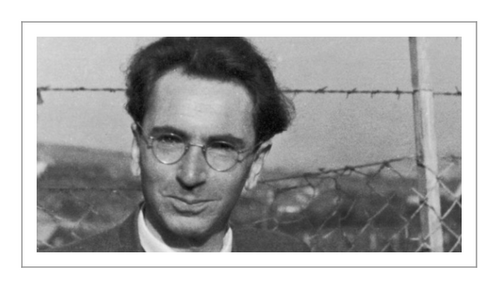What to Do with “Why?” in Our Sufferings

Viktor Frankl, 1945
Viktor Frankl was a Holocaust survivor who famously observed that a man can endure almost any “what” so long as there was a “why.” Frankl was right. As he observed in the Nazi death camps, people ask a lot of questions when their world is crumbling around them. Most of those questions are variations on the themes of “Why?”
It is natural for us to want to connect the dots when we’re in pain. We want to understand why our circumstances have devolved to the point of collapse. We don’t want to think that we live in a cold and pitiless universe where nothing matters and nothing makes sense.
It is good that our suffering presses us to consider these questions.
When we are sailing along blissfully, we aren’t inclined to think deeply about anything. Our problem comes when – like Job, like Naomi and Ruth – we cannot connect the dots. No matter how deeply we think about it, no matter how we approach the question, we cannot arrive at a reason. And then we understand Frankl’s dictum: when we cannot understand why, we are tempted to give up.
But if the Book of Ruth says anything about suffering, it tells us that even when we cannot understand the “why,” there is an answer to our questions. In the story of Ruth, the answer to the question of suffering was not to be found in an explanation but in a person. Naomi and Ruth are never given an explanation for their profound and confounding suffering. But they are given Boaz, their kinsman-redeemer who rescues them from poverty and social shame.
In Boaz we have a lovely picture of our own Kinsman-Redeemer, the Lord Jesus, who gave up His life to rescue us from our own self-induced poverty and shame. Just as Boaz’s first meeting with Ruth pointed forward to a time when she would be fully incorporated into Israel’s covenant community, so Christ’s arrival in our lives is the beginning of our adoption into His family and our ultimate home in Shalom.
Should we ask questions when we find ourselves in distress?
Of course we should. We are humans, after all. We are rational creatures for whom it is as natural to wonder as it is for dogs to bark. Our wondering is inevitable, but it will take us astray if it does not take us in the direction of our Creator and King.
Our wondering why may take the form of railing against the Almighty (as Job does, as the psalmists often do), and that is appropriate. But we will find the deepest answers to the question of suffering when we contemplate that question in the shadow of the Cross, where we see God’s gracious provision of our Kinsman-Redeemer, where our “why” resolves in the “who.”
Persevere.
Paul Pyle
Pastor of Discipleship
It is natural for us to want to connect the dots when we’re in pain. We want to understand why our circumstances have devolved to the point of collapse. We don’t want to think that we live in a cold and pitiless universe where nothing matters and nothing makes sense.
It is good that our suffering presses us to consider these questions.
When we are sailing along blissfully, we aren’t inclined to think deeply about anything. Our problem comes when – like Job, like Naomi and Ruth – we cannot connect the dots. No matter how deeply we think about it, no matter how we approach the question, we cannot arrive at a reason. And then we understand Frankl’s dictum: when we cannot understand why, we are tempted to give up.
But if the Book of Ruth says anything about suffering, it tells us that even when we cannot understand the “why,” there is an answer to our questions. In the story of Ruth, the answer to the question of suffering was not to be found in an explanation but in a person. Naomi and Ruth are never given an explanation for their profound and confounding suffering. But they are given Boaz, their kinsman-redeemer who rescues them from poverty and social shame.
In Boaz we have a lovely picture of our own Kinsman-Redeemer, the Lord Jesus, who gave up His life to rescue us from our own self-induced poverty and shame. Just as Boaz’s first meeting with Ruth pointed forward to a time when she would be fully incorporated into Israel’s covenant community, so Christ’s arrival in our lives is the beginning of our adoption into His family and our ultimate home in Shalom.
Should we ask questions when we find ourselves in distress?
Of course we should. We are humans, after all. We are rational creatures for whom it is as natural to wonder as it is for dogs to bark. Our wondering is inevitable, but it will take us astray if it does not take us in the direction of our Creator and King.
Our wondering why may take the form of railing against the Almighty (as Job does, as the psalmists often do), and that is appropriate. But we will find the deepest answers to the question of suffering when we contemplate that question in the shadow of the Cross, where we see God’s gracious provision of our Kinsman-Redeemer, where our “why” resolves in the “who.”
Persevere.
Paul Pyle
Pastor of Discipleship
Recent
Archive
2025
January
February
March
April
May
July
August
September
October
November
2024
January
February
March
April
May
June
August
September
October
Categories
no categories
